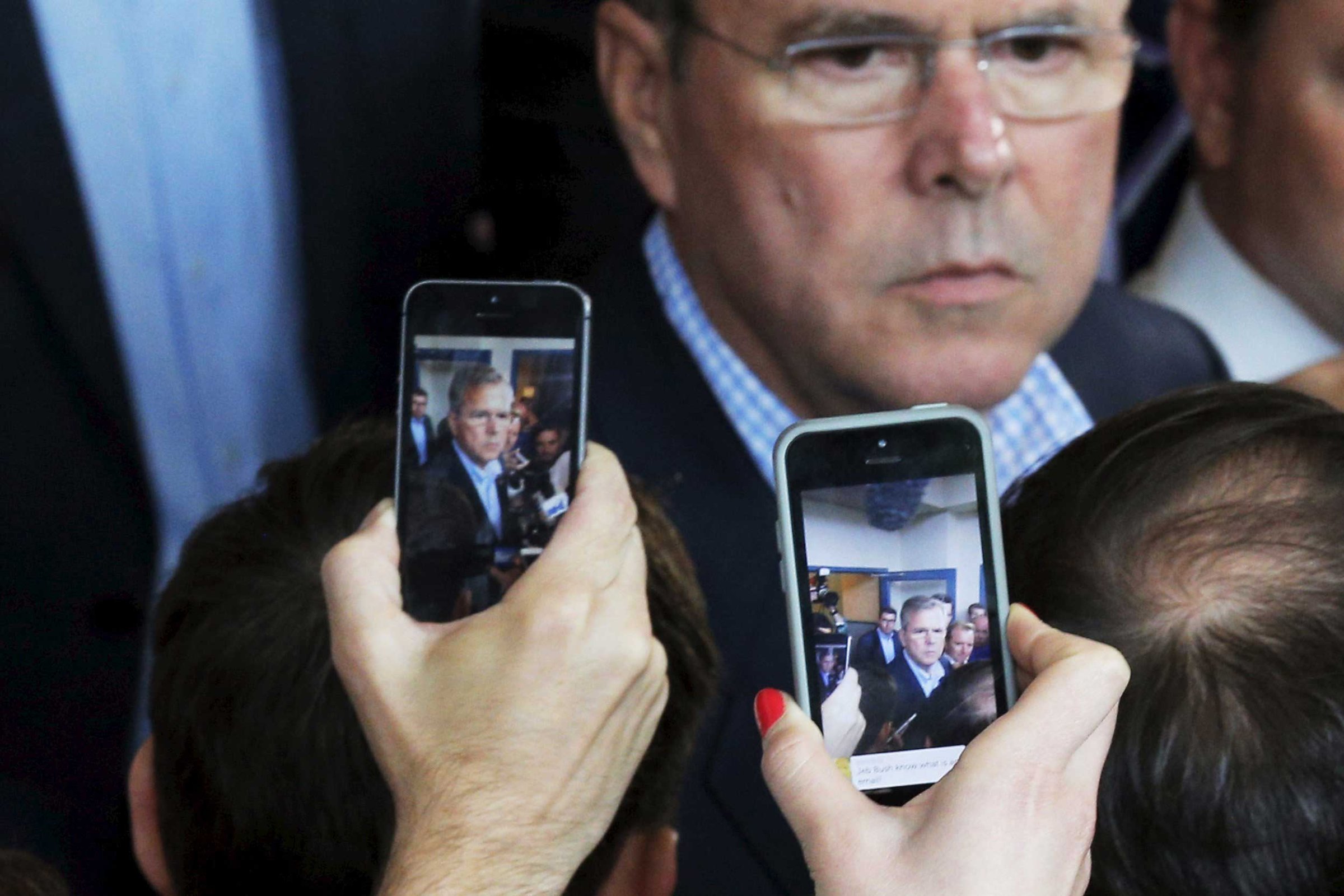
Bob Beckett takes his duty to vet presidential candidates in the nation’s first primary so seriously that it’s listed as his profession on his business card: “Registered New Hampshire Voter.”
He might want to have a few more printed up next year. The Granite State primary is poised to play an even bigger role than usual in the 2016 Republican presidential primary, possibly overshadowing the Iowa caucuses one week earlier.
In part, that’s because Iowa voters have lurched to the right, and the unusually large Republican field has more than a few candidates laying the groundwork to win big there, including Texas Sen. Ted Cruz, former Arkansas Gov. Mike Huckabee and Wisconsin Gov. Scott Walker. Each is climbing over his rivals trying to claim the most conservative corner.
That’s led to candidates who are seen as more moderate, such as former Florida Gov. Jeb Bush, New Jersey Gov. Chris Christie and former New York Gov. George Pataki to pin their hopes on New Hampshire, while the would-be Iowa winners aim for a repeat win. And the states that follow soon after already have home-state figures starting with an advantage: South Carolina is Sen. Lindsey Graham’s home turf, while Florida is a base for both Bush and Sen. Marco Rubio.
With a broader slate of candidates competing in a more wide-open primary, New Hampshire could play a more crucial role winnowing the field. And for now, at least, it’s anyone’s game. Beckett, a 60-year-old sales manager for a technology company, said New Hampshire residents are still shopping around.
“We’re still kicking the tires,” he said, after a recent event in Bedford, N.H. “We vet these guys and figure out who is serious and who is not.”
From a purely logistical point of view, New Hampshire is an easier state to campaign in. Most of the population lives in the southern part of the state, requiring far less driving than Iowa’s expansive stretches between cities. And for the candidates with day jobs in Washington, it’s a quick flight north from the capital.
The state’s politics also make it more of a jump ball for presidential candidates.
Voters who do not identify with either major political party are the largest bloc in the state, and they can cast ballots in either party’s primary. That gives non-affiliated voters a great say in the winner and offers a preview of a candidate’s appeal with ever-crucial swing votes. To win in Iowa, many candidates have taken deeply conservative positions that come back to haunt them as nominees.
“Independents get to vote in our primary. It’s a better test of your general election strength,” said Steve Duprey, a former state GOP chairman who helped guide Sen. John McCain to his 2000 and 2008 victories in the state’s vaunted primary. “We have a broader range of views in the Republican Party than our cousins in Iowa.”
The Hawkeye State’s GOP has been dragged rightward in recent years. A strain of anti-immigration rhetoric has taken hold there, imperiling candidates who have backed proposals to address the more than 11 million immigrants in the country illegally. That spells nothing but a headache for Bush, along with two expected rivals who were the architects of the failed, bipartisan attempt to fix the immigration system: Graham and Rubio.
And Iowa’s deeply religious conservatives demand an orthodoxy that rewards candidates such as former Sen. Rick Santorum, 2012’s caucus winner, or Huckabee, who prevailed in 2008. New Hampshire, by contrast, is consistently among the most secular in the country in Gallup polling.
Instead, New Hampshire’s unofficial religion is politics.
“People here in New Hampshire know that it’s their civic duty. It’s what we do,” said Renee Plummer, a marketing executive who has organized luncheons for White House hopefuls to meet with business leaders. “We vet these people. We ask them the questions again and again, and hopefully we do it well for the country.”
History backs up that claim. Only three times since 1952 has the GOP nominee not carried New Hampshire. Iowa, by contrast, is a relatively new recent beachhead for the GOP. And since 1980, the state has four times backed candidates who failed to win the nomination.
It has become a cliché, for sure, but there is something to the refrain that Iowa picks corn while New Hampshire picks presidents.
It’s why Beckett and his neighbors crowded into a house near Manchester this week to hear Bush answer their questions about climate change, foreign policy and education.
“It’s just another day in New Hampshire,” host Rich Ashooh quipped to his guests who packed his living room to hear Bush.
Given the importance of New Hampshire, voters in the state should expect frequent visits from these likely candidates.
“I’m going to engage fully in New Hampshire,” Bush promised a talk-radio interviewer on Thursday as he drove between events.
While nodding to Iowa, it was clear Bush was betting big on New Hampshire: “These early states matter.”
More Must-Reads From TIME
- The 100 Most Influential People of 2024
- Coco Gauff Is Playing for Herself Now
- Scenes From Pro-Palestinian Encampments Across U.S. Universities
- 6 Compliments That Land Every Time
- If You're Dating Right Now , You're Brave: Column
- The AI That Could Heal a Divided Internet
- Fallout Is a Brilliant Model for the Future of Video Game Adaptations
- Want Weekly Recs on What to Watch, Read, and More? Sign Up for Worth Your Time
Write to Philip Elliott / Bedford, N.H. at philip.elliott@time.com